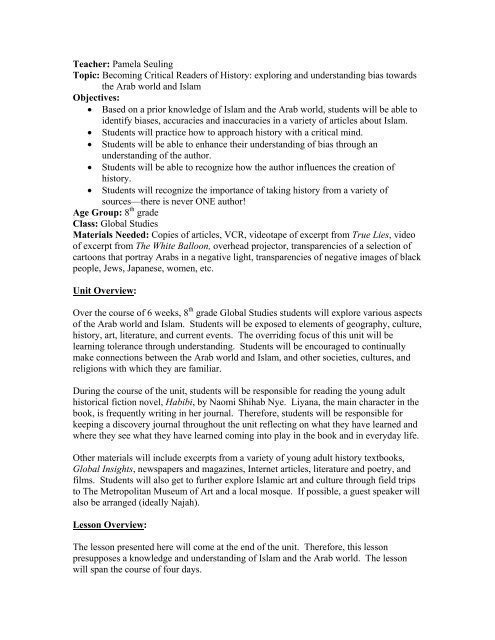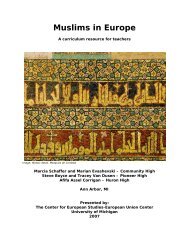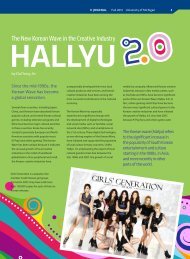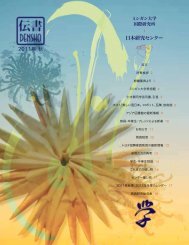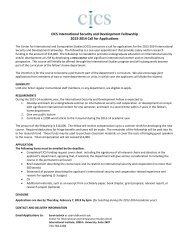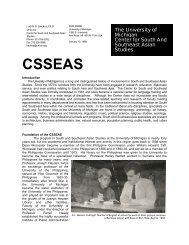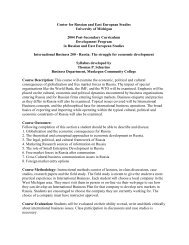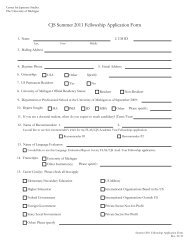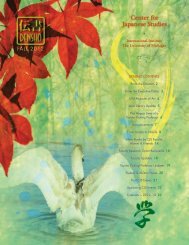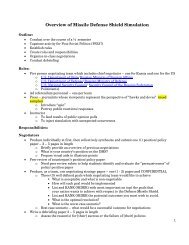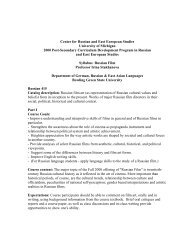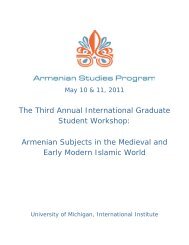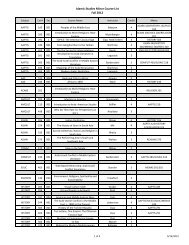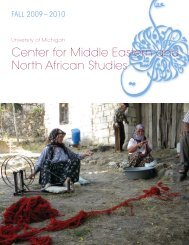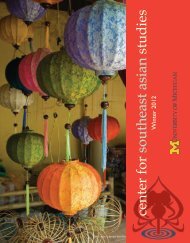Bias Toward Arab World and Islam 8th Grade Global Studies Unit
Bias Toward Arab World and Islam 8th Grade Global Studies Unit
Bias Toward Arab World and Islam 8th Grade Global Studies Unit
You also want an ePaper? Increase the reach of your titles
YUMPU automatically turns print PDFs into web optimized ePapers that Google loves.
Teacher: Pamela Seuling<br />
Topic: Becoming Critical Readers of History: exploring <strong>and</strong> underst<strong>and</strong>ing bias towards<br />
the <strong>Arab</strong> world <strong>and</strong> <strong>Islam</strong><br />
Objectives:<br />
• Based on a prior knowledge of <strong>Islam</strong> <strong>and</strong> the <strong>Arab</strong> world, students will be able to<br />
identify biases, accuracies <strong>and</strong> inaccuracies in a variety of articles about <strong>Islam</strong>.<br />
• Students will practice how to approach history with a critical mind.<br />
• Students will be able to enhance their underst<strong>and</strong>ing of bias through an<br />
underst<strong>and</strong>ing of the author.<br />
• Students will be able to recognize how the author influences the creation of<br />
history.<br />
• Students will recognize the importance of taking history from a variety of<br />
sources—there is never ONE author!<br />
Age Group: 8 th grade<br />
Class: <strong>Global</strong> <strong>Studies</strong><br />
Materials Needed: Copies of articles, VCR, videotape of excerpt from True Lies, video<br />
of excerpt from The White Balloon, overhead projector, transparencies of a selection of<br />
cartoons that portray <strong>Arab</strong>s in a negative light, transparencies of negative images of black<br />
people, Jews, Japanese, women, etc.<br />
<strong>Unit</strong> Overview:<br />
Over the course of 6 weeks, 8 th grade <strong>Global</strong> <strong>Studies</strong> students will explore various aspects<br />
of the <strong>Arab</strong> world <strong>and</strong> <strong>Islam</strong>. Students will be exposed to elements of geography, culture,<br />
history, art, literature, <strong>and</strong> current events. The overriding focus of this unit will be<br />
learning tolerance through underst<strong>and</strong>ing. Students will be encouraged to continually<br />
make connections between the <strong>Arab</strong> world <strong>and</strong> <strong>Islam</strong>, <strong>and</strong> other societies, cultures, <strong>and</strong><br />
religions with which they are familiar.<br />
During the course of the unit, students will be responsible for reading the young adult<br />
historical fiction novel, Habibi, by Naomi Shihab Nye. Liyana, the main character in the<br />
book, is frequently writing in her journal. Therefore, students will be responsible for<br />
keeping a discovery journal throughout the unit reflecting on what they have learned <strong>and</strong><br />
where they see what they have learned coming into play in the book <strong>and</strong> in everyday life.<br />
Other materials will include excerpts from a variety of young adult history textbooks,<br />
<strong>Global</strong> Insights, newspapers <strong>and</strong> magazines, Internet articles, literature <strong>and</strong> poetry, <strong>and</strong><br />
films. Students will also get to further explore <strong>Islam</strong>ic art <strong>and</strong> culture through field trips<br />
to The Metropolitan Museum of Art <strong>and</strong> a local mosque. If possible, a guest speaker will<br />
also be arranged (ideally Najah).<br />
Lesson Overview:<br />
The lesson presented here will come at the end of the unit. Therefore, this lesson<br />
presupposes a knowledge <strong>and</strong> underst<strong>and</strong>ing of <strong>Islam</strong> <strong>and</strong> the <strong>Arab</strong> world. The lesson<br />
will span the course of four days.
During the course of this lesson, students will examine a wide variety of articles, some of<br />
which are pro-<strong>Islam</strong> <strong>and</strong> some of which are anti-<strong>Islam</strong>. They will be responsible for<br />
analyzing these articles for things like biases, accuracies <strong>and</strong> inaccuracies, <strong>and</strong> personal<br />
agendas. They will be expected to take notes, teach each other what they learned, <strong>and</strong><br />
engage in fruitful discussions.<br />
The following are the essential questions for this lesson:<br />
Essential Questions:<br />
1. What is the significance of being able to discriminate the actions of a small group<br />
from the actions of the larger group with which they identify?<br />
2. Why is it important to distinguish between religion <strong>and</strong> political actions?<br />
3. Why is it important to underst<strong>and</strong> the author before you read his or her history?<br />
4. How can personal agendas get in the way of history?<br />
Day One:<br />
As a “do now” or jump-off activity, students will be asked to take five minutes <strong>and</strong> write<br />
an account of what happened on the playground that day. Several student volunteers will<br />
then be asked to read their accounts. Students will then make observations about how the<br />
accounts differed. Finally, they will be asked to think about why these accounts were<br />
different, even though each student was writing about what happened at the same place at<br />
the same time.<br />
Students will then be divided into even “expert groups”. This is a jigsaw activity, so the<br />
number of students in each group should, as closely as possible, equal the number of<br />
groups (for example, a class of 25 students should be divided into 5 groups of 5 students<br />
each). Each group will receive a different article. After reading the article together,<br />
students will be responsible for discussing <strong>and</strong> answering the following questions (each<br />
student must take notes because each student will eventually be responsible for teaching<br />
other students their group’s conclusions).<br />
Questions:<br />
1. What point is the author or subject of the article trying to make?<br />
2. Is this point anti or pro <strong>Islam</strong>?<br />
3. What are the facts that the author or subject uses to support his or her argument?<br />
4. Are these facts accurate? If not, what are the truths?
5. What do you know about the author or subject?<br />
6. Why do you think the author or subject is trying to make this point? (what<br />
purpose does it serve him/her?).<br />
7. What audience do you think the author is hoping to reach?<br />
Day Two:<br />
Expert groups will be divided up to form new “heterogeneous groups” that are comprised<br />
of one person from each expert group. Each student in this new heterogeneous group is<br />
responsible for summarizing his/her expert group’s article <strong>and</strong> conclusions from the day<br />
before. Other group members are responsible for taking notes on each presentation.<br />
After every group member has shared, these new heterogeneous groups will be<br />
responsible for drawing their own group conclusions:<br />
1. What are some similarities you see between the different articles?<br />
2. What are some differences?<br />
3. Which articles teach something positive? What are those positive elements?<br />
Why are they positive?<br />
4. Which articles teach something negative? What are those negative elements?<br />
Why are they negative?<br />
Day Three:<br />
Students will participate in a Socratic Seminar based on what they explored <strong>and</strong><br />
discovered over the past two days (for a great introduction to the Socratic Seminar, visit<br />
www.mcps.k12.md.us/schools/wjhs/depts/socialst/ams/Skills/SocraticSeminar/SocraticSe<br />
minarIntro.html).<br />
Each heterogeneous group will get approximately 5 minutes to be inside the “fishbowl”.<br />
They will be given a series of questions to discuss. One member of the group will be the<br />
group leader, <strong>and</strong> will be responsible for guiding <strong>and</strong> mediating the discussion in addition<br />
to being an active participant. The following are examples of questions that each group<br />
will be asked to address (most groups won’t be able to address all of these questions in<br />
only 5 minutes):<br />
1. Is it important to be able to differentiate between the actions of a small group <strong>and</strong><br />
the actions of the larger group with which they identify? Why or why not?<br />
2. Is it important to distinguish between religion <strong>and</strong> political actions? Why or why<br />
not?
3. Is it important to underst<strong>and</strong> the author before you read his or her history? Why<br />
or why not?<br />
4. Can personal agendas get in the way of history? Why or why not?<br />
5. What do you think has generally been the <strong>Unit</strong>ed States’ attitude toward the <strong>Arab</strong><br />
world over the past year or two? Why?<br />
6. How did your knowledge of <strong>Islam</strong> <strong>and</strong> the <strong>Arab</strong> world help you underst<strong>and</strong> the<br />
articles?<br />
7. Do you think most people in America would have the knowledge base to be able<br />
to underst<strong>and</strong> the articles in the way that you did?<br />
8. What might be the results of a society that is not educated to underst<strong>and</strong> about the<br />
<strong>Arab</strong> world <strong>and</strong> <strong>Islam</strong>?<br />
Each group’s discussion will be observed by the rest of the class, who will be in a circle<br />
around them. Audience members will be assigned various different tasks while<br />
observing the group in the fishbowl. For example, one student audience member might<br />
be responsible for recording how often each group member cites reasons <strong>and</strong> evidence to<br />
back up his or her statements. The following is a suggested list of other things student<br />
audience members can be responsible for observing <strong>and</strong> recording:<br />
Speaking loudly <strong>and</strong> clearly<br />
Using the text the find support for arguments<br />
Listening to others respectfully<br />
Sticking to the subject<br />
Talking to each other, not just to the leader or the teacher<br />
Paraphrasing accurately<br />
Avoiding inappropriate language<br />
Asking for help to clear up confusion<br />
Supporting each other<br />
Avoiding hostile exchanges<br />
Questioning others in a civil manner<br />
Seeming prepared<br />
These student recorders will be asked to briefly report their findings after each group<br />
discussion.<br />
Homework: Students will be asked to do one of the following:<br />
1) Find an article in a newspaper or magazine dealing with some aspect of the <strong>Arab</strong><br />
world or <strong>Islam</strong> <strong>and</strong> bring it in. Write a paragraph summarizing what the article is<br />
about, <strong>and</strong> a second paragraph noting areas in the article where you detect bias (be<br />
sure to note where you got this article!)
2) Watch the news <strong>and</strong> keep a journal in which you make note of how stories about<br />
the <strong>Arab</strong> world are addressed (what images are used? what phrases are used? what<br />
kind of commentary does the newscaster make about the subject? do you detect<br />
any sort of bias on the part of the newscaster?)<br />
3) Find a cartoon in which the <strong>Arab</strong> world or <strong>Islam</strong> is portrayed in a negative light<br />
<strong>and</strong> bring it in. Write a paragraph in which you analyze the cartoon <strong>and</strong> explain<br />
how it portrays the <strong>Arab</strong> world or <strong>Islam</strong> in a negative light.<br />
Day Four:<br />
Students will be asked to share their homework observations with their group-mates.<br />
Students will then be asked to share materials <strong>and</strong> observations with the whole class.<br />
After a brief discussion, students will see a clip from True Lies <strong>and</strong> will be asked to jot<br />
down observations while they watch. Students will then share these observations.<br />
After a brief discussion, students will then see a selection of cartoons depicting the <strong>Arab</strong><br />
world or <strong>Islam</strong> in a negative light.<br />
After a brief discussion, students will then see a clip from The White Balloon <strong>and</strong> will be<br />
asked to jot down observations while they watch. They will be asked to compare the two<br />
film clips <strong>and</strong> the cartoons. What did they notice? Who are the “authors” of these<br />
different pieces of media? How do the authors <strong>and</strong> their own context influence how they<br />
portray the <strong>Arab</strong> world? Where else in the history of the media can we see other<br />
examples of “unreliable” or biased authors?<br />
Conclude with showing negative images of black people, Jews, Japanese, women, etc.<br />
What purposes do “we” hope to serve in presenting derogatory images of particular<br />
groups?
Articles:<br />
www.stopislam.com/facts.html “Facts about <strong>Islam</strong>”<br />
www.southend.wayne.edu/days/feb2002/2262002/oped/islam/islam.html “<strong>Islam</strong> Sucks”<br />
by Joe Fisher<br />
http://198.65.147.194/English/News/2002-01/19/article52.shtml “Tennessee Pastor<br />
Launches Anti-<strong>Islam</strong> Campaign”<br />
www.aljadid.com/essays/0736chalala.html “<strong>Arab</strong> Americans After September 11 th :<br />
Rethinking Ideas Not Carved in Stone” by Elie Chalala<br />
www.observer.co.uk/comment/story/0,6903,552800,00.html “’When the innocent are<br />
murdered, we all go into the dark with them’” by Ziauddin Sardar<br />
www.rac.org/news/070999.html “In a Letter to Senator Larry Craig Saperstein<br />
Condemns Bigoted, Anti-<strong>Islam</strong> Remarks of Senate Policy Committee Staffer”


